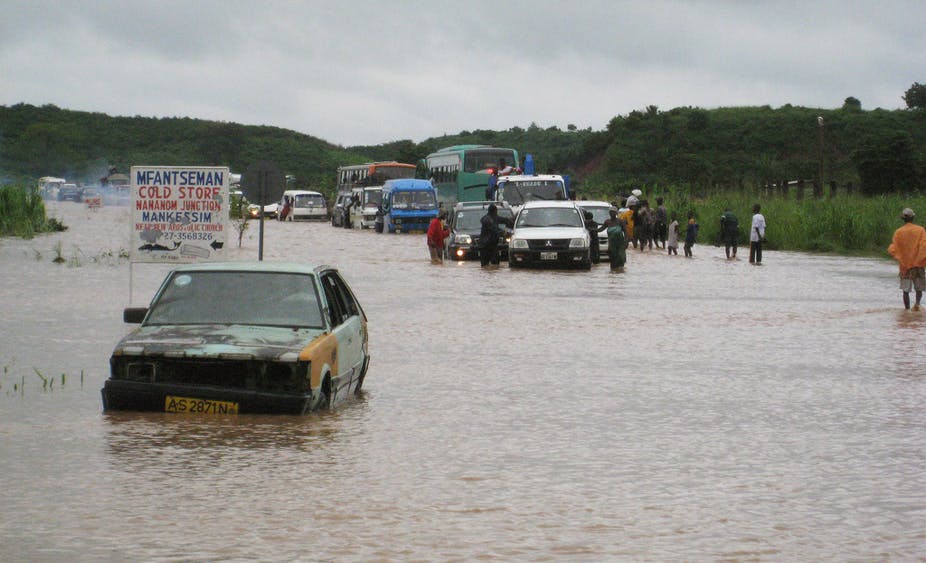A friend asked me today to write about this because apparently it rained today and many communities in Accra were flooded. I thought about this for a moment and heard it on some of the Ghanaian news media reporting deaths and destruction of property. My first thought was that this is nothing new because I remember writing about this a few years back when a major flood led to the death of at least 150 people and many injuries in downtown Accra.
My investigation showed at the time that Ghana, particularly Accra, has experienced floods since 1959. According to Reliefweb, Accra and kumasi have experienced floods for at least 50 years, affected over million people and dedtroyed properties and valuables valued around USD $800 million.
In the past 10 years, at least one major flood occurs in Ghana’s major cities each year.
My initial hesitancy to write about this was the boredom with this topic. I thought to myself this has been occurring for ages and nothing has changed so why bother? What is different about this year’s? But for the sake of my friend who requested this piece I decided to pay attention to today’s event and see what’s different this time.
Today’s Flood:Impacts?
Like past years, today’s flood after just about 5 hours rainfall led to multiple deaths, injuries and destruction of properties in many communities in Accra. One man was electrocuted in Odawna area while attempting to retrieve his belongings from his flooded home, five people were also reported dead in the Adabraka area, two members of the same family, including an 18 year old high school student, died when a nearby concrete fence wall fell on their temporary structure where they were sleeping in Achimota Village, and in that same area, the body of a baby was found flooded in muddy waters. Several others in distress were being rescued by emergency personnel.
Newly constructed railway trucks have been destroyed in the Achimota area while a water treatment plant and several other properties have also been destroyed.
So Why do Floods Keep Recurring?
Well, West Africa is no stranger to seasonal rainfalls and Ghana is not an exception. These are expected to worsen in the next 40 or so years. With the exception of northern Ghana where floods results from a spillover from Burkina Faso dam, major floods in Ghana are primarily caused seasonal rainfalls, poor drainage, indiscriminate dumping of solid waste in waterways and low elevation of settlements.
Ghaba’s large cities especially Accra and Kumasi are more prone to floods due to a growing population and buildings which reduces the soil areas for drainage excess rain water. 40% of Accra is already susceptible to flood.
Government Measures Short Term:
- short term coping strategies such as rescue and recovery by the military, police, fire, national disaster management organizations (NADMO) and other emergency teams
- Repairs of damaged infrastructure
- Clearing and desilting of waterways and lagoons
- Demolition of properties and squatter structures located in waterways
- The construction of a few storm drains in Odawna since 2015 (even not yet completed)
- Water and Sanitation Project in the Accra Metropolitan Area (but not adequate)
- Although part of Adaptation Programs, Resilient cities network, Africa Adaptation Projects against flood but no real action
- Projects against floods minimal and only along coastal lines i.e. Keta Sea Defense project
- No strategies to address underlying risks factors
- No proactive flood management strategies to minimize flood risks
The Ghana government could do more. How can Ghana not develop long term and more effective flood management strategies in 50 years? Do our policy makers just learn raw book knowldge, big English, suit wearing and bare democracies from western countries and not learn strategies for developing our societies? Why is the government not looking at the several studies and research done on flood mangement?
Effective Management Strategies?
Ghana should learn from a country like the Netherlands which is 40% below sea level and 60% of its land area prone to floods yet prevented major floods. Ghana must adopt long term measures including:
- The construction of drainage and levees in all flood prone areas
- Adoption and implementation of a 24 hour flood warning systems: to monitor, warn and educate citizens on response mechanisms during flood seasons
- Development and implementation of strict building codes and bylaws to prevent construction of buildings in waterways and flood prone areas
- The restoration of lagoons and rivers/waterways
- Provisions of affordable housing for the urban poor
- Better waste management, collection and treatment facilities
- Better drainage systems
- The creation of buffer zones to protect vegetation and wetlands in urban areas to improve water drainage
- The promotion and usage of water resistant building materials
Experts say every $1 spent on long term flood management strategies will save between $4 to $9 in the end and save many lives.
Food for thought.
The days of hoping and praying are over. Time to act! Instead of bickering, yelling and wanting to win elections through tricks, propaganda, we should be showcasing better policies. Citizens must act responsibly and comply with city bylaws.
Akosua G
Ontario Canada
June 10, 2020
References:
https://mobile.ghanaweb.com/GhanaHomePage/NewsArchive/dossier.php?ID=149
https://www.myjoyonline.com/news/national/parts-of-accra-flooded-after-early-morning-downpour/
https://www.myjoyonline.com/news/national/one-dead-as-military-nadmo-move-to-rescue-accra-flood-victims/
https://reliefweb.int/report/ghana/ghana-must-move-coping-floods-adapting-them
http://www.xinhuanet.com/english/2020-06/10/c_139127242.htm
